
Batterham Medal for Engineering Excellence
The Batterham Medal is an early career award for a graduate engineer who has achieved substantial peer/industry recognition for their work in the past five years. The award consists of a medal and a cash prize of $5000 sponsored by the Group of Eight Deans of Engineering and Associates.
The Awardee will have:
- demonstrated excellence, innovation and impact in a field of engineering
- clearly demonstrated a signature contribution to engineering in the five years prior to their nomination
- advanced the standing of the engineering profession.
Please review the guidelines below for more information.
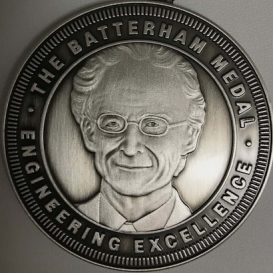
History of the Batterham Medal
The Batterham Medal was established in 2014 to be presented annually by the Academy as an early career award.
The awardee will be a graduate engineer who has achieved substantial peer/industry recognition for their work in the past five years.
The award is funded by the Group of Eight Deans of Engineering and Associates.
The Academy has formed a Batterham Medal Selection Committee, which includes a nominee of the Deans.
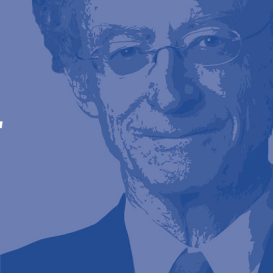
About Professor Robin Batterham AO FREng FAA FTSE
Professor Robin Batterham AO FREng FAA FTSE graduated from the University of Melbourne in 1965 with a degree in chemical engineering and received a PhD from the same institution in 1969.
He received a scholarship from the CSIRO to undertake postgraduate studies at the central research laboratories of ICI in Britain. He returned to Australia in 1970 and took up the position of chief scientist of the CSIRO’s Division of Mineral Engineering, and was later promoted to division chief.
In 1999, he was appointed Chief Scientist of Australia, a role which he undertook simultaneously to acting as chief technologist for the multinational mining company Rio Tinto. In May 2005, he stepped down as Chief Scientist and took on a full-time position at Rio Tinto.
He was elected a Fellow of the Academy in 1988 and served as its President from 2007 to 2012. He was named a Fellow of the Institute of Engineers Australia in 1999. He became a Fellow of the Australian Academy of Science in 2000. From May 2004 to May 2005, he was President of the Institution of Chemical Engineers, of which he became a Fellow in 1988. He became a Foreign Member of the Royal Academy of Engineering in 2004.
After retiring from Rio Tinto in 2009, Professor Batterham joined the Melbourne School of Engineering as Kernot Professor in the Department of Chemical and Biomolecular Engineering in 2010. He was awarded an AO in 2004.
Past winners
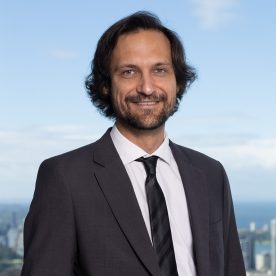
2023 winner
Dr Conrad Wasko
As a hydrological engineer, Dr Conrad Wasko has transformed our understanding of how climate change will affect floods.
Ten years ago, the scientific community knew little about the relationship between climate change and flooding. Conrad’s world-leading research has filled this global knowledge gap, discovering that we won’t see universal increases in flood events with the changing climate. Conrad has found that small floods—those that fill up water supplies—are decreasing and in contrast, larger damaging flood events are becoming more frequent.
Conrad was also the first to conclusively show that storms intensify as temperatures increase. This has implications for urban flooding as intense rainfall in concreted urban areas can result in flash floods.
A senior lecturer at the University of Melbourne and Australian Research Council Fellow, Conrad’s discoveries are helping us adapt to and mitigate changing flood and water patterns. His clear communication of complex uncertainty informs engineering recommendations and updated flood guidance across Australia.

2022 winner
Dr Aaron McFadyen
Dr Aaron McFadyen is an early career researcher who has developed air traffic management technology enabling the safe expansion of drone flight numbers over urban areas.
The rapid expansion of the drone market required transformative change as the previous process for approving flights in controlled airspace was manual and could take weeks.
In close collaboration with authorities, Aaron led development of key technology now underpinning Australia’s automated approval system for drone flights.
His focus on creating autonomous technologies that balance regulatory, safety, and commercial imperatives drew on his research innovation, aerospace engineering skills, and practical aviation experience as a pilot.
Aaron’s game-changing technology has helped reduce drone flight approval times from weeks to minutes, saving operators and authorities hundreds of thousands of dollars while increasing opportunities for Australian industry.
The system focuses on drone use in highly controlled airspace around airports but it can be scaled up to cover all Australian airspace.
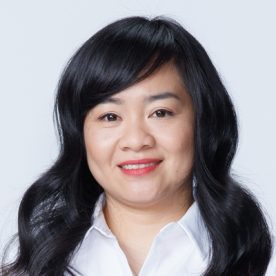
2021 winner
Dr Kate Nguyen, RMIT
Dr Kate Nguyen is an early career researcher whose ground-breaking work is making buildings safer and construction more sustainable.
The 2017 Grenfell Tower blaze in London that claimed 72 lives exposed the dangers of aluminium composite cladding. In the aftermath of the disaster, and in collaboration with industry, Dr Nguyen came up with a light-weight, cost-effective alternative cladding material using ceramic particles that will not combust during a structural fire. She has also developed various nano-based construction products that were analysed in commercial buildings, such as the City Hall in Utrecht, the Netherlands.
She has also quickly established herself as a national expert in advancing the sustainability of fire-resistant construction materials. Partnering with industry, Dr Nguyen has provided a solution for the safe removal and transformation of combustible construction waste into high value, fire-retardant pre-fabricated building materials.
Dr Nguyen is currently the leader of the Innovative Fire and Façade Engineering Group at RMIT University, collaborating closely with some of the major construction partners who are end-users of her innovative research.
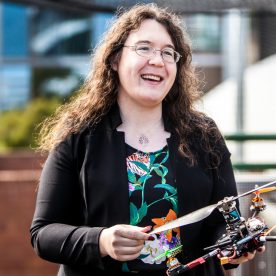
2020 winner
Associate Professor Pauline Pounds, University of Queensland
Associate Professor Pauline Pounds is an engineering trailblazer whose groundbreaking contributions to designing unmanned aerial vehicles have been game changing for the last 15 years.
Her creative and innovative problem-solving approach has systematically eliminated many previously critical limitations on drone technology, paving the way for new generations of large multirotor drones capable of practical real-world applications ranging from package delivery to search-and-rescue operations
Associate Professor Pounds’ most recent innovation – aerodynamic motion sensors – offer unprecedented precision measurement and control.
Her rotor velocimetry technology is the best in the world, and enables safer, more effective drone use in challenging conditions.
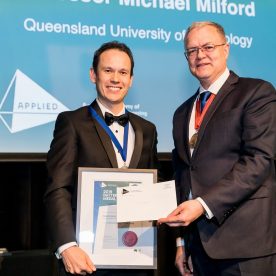
2019 winner
Professor Michael Milford, Queensland University of Technology
Professor Milford’s pioneering transdisciplinary research spans biology, neuroscience, robotics, machine learning and computer vision to create new technologies for autonomous vehicles and robotics. His team has achieved world-first advancements in translating abstract neuroscience concepts and theories into rugged technology that is being trialled in real-world commercial applications. Professor Milford’s internationally renowned contributions to his field of engineering have resulted in major research and industry funding, many prestigious international and national awards, and high-profile collaborations and projects with end-users including Caterpillar, the US Air Force, the Queensland Government, Google Deepmind and NASA’s Jet Propulsion Laboratory.

2018 winner
Associate Professor Madhu Bhaskaran, RMIT University
Just eight years after completing her PhD, Associate Professor Madhu Bhaskaran is pioneering research in oxide-based flexible electronics – stretchy, unbreakable, transparent electronic devices. She developed a transfer process to make these devices functional, combining brittle oxide materials (like those making up a smartphone touchscreen) with soft, pliable silicone rubber. Potential applications abound in optics research, as well as use as gas sensors to pick up pollutants and as patches to track UV exposure.
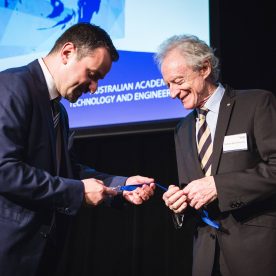
2017 winner
Professor Nick Birbilis, Monash University
Professor Birbilis has had an impressive career to date. Then 39, he is a professor, the Head of Materials Science and Engineering and is the Woodside Innovation Chair at Monash University. He is an internationally recognised expert in corrosion, durability management and the behaviour of metallic elements.
2016 winner
Associate Professor Andrew Fleming, University of Newcastle
Andrew Fleming is Associate Professor of Electrical Engineering at the University of Newcastle, where he graduated with a PhD in 2004. He has made an outstanding contribution to the science and engineering of nanoscale imaging and fabrication systems. A recognised expert in the modelling, control and engineering of ultra-high-precision imaging and fabrication systems, Associate Professor Fleming has consulted on some of the world’s most ambitious scientific and industrial projects for NASA, The National Accelerator Laboratory, The Lawrence Berkeley Laboratory, Boeing, Stanford University, Nikon Research, and the Defence Science and Technology Group in Australia.
2015 winner
Dr Lachlan Blackhall, Chief Technology Officer of Reposit Power
Dr Blackhall is founder and Chief Technology Officer of Reposit Power, a technology company designing advanced control systems for grid-deployed energy storage in the ACT. As CTO, he has pioneered the use of distributed control schemes to manage, control and optimise the performance of distributed energy storage systems. The control system he has developed not only optimises the storage and shifting of excess solar generation but, in a world first, allows the trading of distributed stored energy directly with energy utilities and the broader energy market.